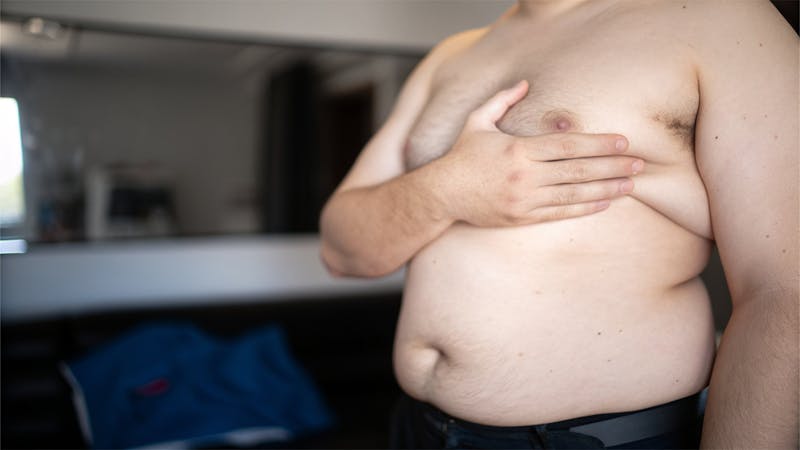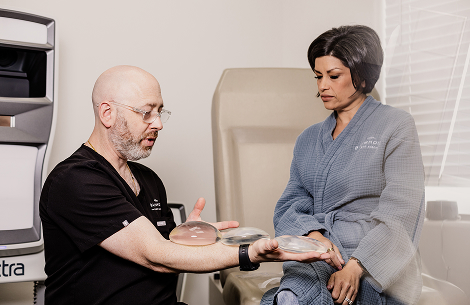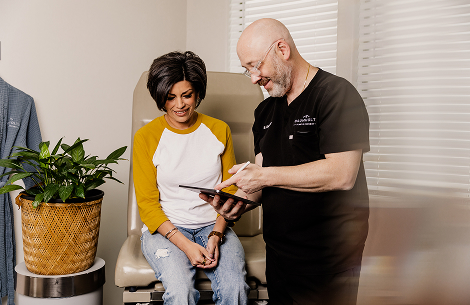
Gynecomastia, often called "gyno," is one of the most common reasons men visit a plastic surgeon. While it doesn’t threaten physical health, it can take a real emotional toll. Many men describe years of frustration or embarrassment, avoiding the gym, swimming, or fitted shirts. Some even say intimacy becomes difficult because they feel self-conscious about their chest.
When a man finally decides to have surgery, the results can be life-changing. But one question comes up in almost every consultation: "Will it come back?"
That’s an honest and important question. Surgery requires recovery, investment, and commitment, so patients deserve clear answers. Dr. Michael Baumholtz, a dual-board-certified Plastic and General Surgeon in San Antonio, TX, performs a high volume of both primary and revision gynecomastia procedures. His answer is straightforward: recurrence is possible but uncommon when the right causes are identified and the right procedure is done.
Understanding What Gynecomastia Really Is
True gynecomastia isn’t just fat. It’s glandular breast tissue that develops under the nipple due to hormonal influence. This dense tissue doesn’t go away with diet or exercise. Weight loss may shrink chest fat, but the glandular tissue usually remains, creating persistent projection.
Some men also have excess fat and stretched skin, which can change how the chest looks and how surgery must be performed.
By contrast, pseudogynecomastia is caused only by fat and can be treated with liposuction alone. Choosing the right procedure matters because treating glandular gynecomastia with liposuction only often leads to dissatisfaction and recurrence.
Can Gynecomastia Return After Surgery?
Technically, yes, but true recurrence is rare when the underlying problem and glandular tissue are properly addressed.
Sometimes what patients perceive as recurrence is actually:
- Residual gland left from a prior incomplete surgery
- Swelling or scar tissue in early healing
- Weight gain, which can return chest fullness
- Hormonal or medication effects that continue after surgery
True regrowth of glandular tissue is unusual. Dr. Baumholtz discusses all of these factors before surgery so patients understand what to expect and how to protect their results.
Dr. Baumholtz’s Technique and Clarification
Every gynecomastia case is individualized.
- For mild to moderate cases, Dr. Baumholtz performs a minimal-incision procedure combining power-assisted liposuction with arthroscopic debridement to precisely remove glandular tissue through small, hidden openings.
- For severe gynecomastia or loose skin, he may perform a mastectomy with free nipple graft, which removes gland and skin while repositioning the nipple for a masculine contour.
Clarification:
In the minimal-incision approach, a small portion of glandular tissue is intentionally left behind to preserve natural chest contour. This is explained both before and after surgery. Patients sometimes feel this remnant and worry that the gynecomastia has returned, but this tissue is deliberately preserved to avoid a hollow or indented appearance.
All patients wear a compression garment for about six weeks to reduce swelling, prevent fluid buildup, and support even healing. Skipping compression increases the risk of swelling that can mimic recurrence.
See Before and After Photos of Gynecomastia Surgery
Why Gynecomastia Might Return
Recurrence generally falls into four categories:
- Hormonal imbalance – Low testosterone or increased estrogen can restimulate gland tissue.
- Medications or substances – Certain psychiatric, prostate, or seizure drugs, as well as anabolic steroids or marijuana, can trigger regrowth.
- Weight gain – Fat can return to the chest even if the gland is gone.
- Incomplete surgery – If glandular tissue remains, the chest may still project.
Dr. Baumholtz emphasizes that while surgery removes tissue, it doesn’t control hormones or lifestyle factors. Those must be managed for lasting results.
Setting Realistic Expectations
Dr. Baumholtz’s practice is built on honesty. He tells patients: "Surgery changes tissue, but it doesn’t rewrite hormones."
Patients who continue hormone-altering drugs, steroids, or gain significant weight may see chest changes again. Most men, however, enjoy permanent improvement when they follow recommendations.
Who Faces a Higher Risk of Recurrence
- Teenagers and young men whose hormones may not yet be stable
- Patients taking hormone-influencing drugs
- Men with significant weight fluctuations
The Importance of Surgical Expertise
Gynecomastia surgery requires precision. Removing too much gland can create a divot, while removing too little can leave projection. Dr. Baumholtz’s dual training in General and Plastic Surgery and extensive revision experience allow him to balance both function and aesthetics safely.
He frequently manages complex revision cases and believes informed, realistic patients have the best long-term satisfaction.
Protecting Your Results
Patients play a key role in maintaining results. Dr. Baumholtz advises:
- Wear compression as instructed.
- Avoid steroids, marijuana, and hormone-altering supplements.
- Maintain a stable, healthy weight.
- Keep scheduled follow-ups, many of which can be done virtually.
This partnership between surgeon and patient ensures the best possible outcome.
FAQs About Gynecomastia Returning After Surgery
Can lifting heavy weights too soon after surgery make gyno come back?
No. Weightlifting doesn’t cause tissue to regrow, but returning to strenuous exercise too early can increase swelling or delay healing. Follow Dr. Baumholtz’s recovery instructions closely before resuming workouts.
If I move away from San Antonio, will I still need to see Dr. Baumholtz in person for follow-ups?
Not necessarily. Many follow-ups can be done virtually after the initial healing period. Dr. Baumholtz uses secure technology to stay connected with patients who cannot return in person.
Does the Texas heat affect healing or recurrence after surgery?
Heat doesn’t cause recurrence, but sweating under compression garments can be uncomfortable. Stay cool, hydrated, and consistent with garment use, even during San Antonio summers.
Can drinking beer or alcohol regularly increase my chances of gyno coming back?
Alcohol doesn’t directly cause recurrence, but heavy or frequent use can affect hormone balance. Moderation supports overall health and stable results.
Is recurrence more common in men who had surgery in their teens compared to adults?
Yes. Younger patients may still experience hormonal shifts until puberty fully stabilizes. Dr. Baumholtz discusses this risk carefully with patients and families considering early surgery.
If only one side of my chest looks fuller again, does that mean gyno has returned?
Not necessarily. Asymmetry may result from swelling, scar tissue, or fat distribution. A physical exam is needed to determine whether it’s true glandular regrowth.
Do changes in weight during military service or intense training increase the chance of recurrence?
Significant weight changes can alter chest appearance even if the gland is gone. Dr. Baumholtz encourages maintaining consistent weight to preserve surgical results.
Medical References
- Long-Term Follow-up of Recurrence and Patient Satisfaction After Surgical Treatment of Gynecomastia
https://pubmed.ncbi.nlm.nih.gov/28280898/ - Gynecomastia: Etiology, Diagnosis, and Treatment - Endotext (NCBI Bookshelf)
https://www.ncbi.nlm.nih.gov/books/NBK279105/ - Management of Gynecomastia—Changes in Psychological and Clinical Outcomes - Annals of Gynecology Surgery
https://gs.amegroups.org/article/view/19032/html - Influence of Postoperative Finasteride Therapy on Gynecomastia Recurrence - Sage Journals
https://journals.sagepub.com/doi/10.1177/1557988319871423 - Comprehensive Aesthetic Corrections of Gynecomastia Using Enhanced Liposuction Combined with Pull-Through and Bottom-Up Technique - ScienceDirect
https://www.sciencedirect.com/science/article/pii/S1015958423011533 - Future Role for General Gynecomastia Patients in Plastic Surgery: Use of Low-Dose Radiotherapy to Prevent Recurrence - ScienceDirect
https://www.sciencedirect.com/science/article/abs/pii/S1748681521002023
The Bottom Line
Gynecomastia surgery provides long-lasting improvement for most men. True recurrence is uncommon when glandular tissue is removed properly and lifestyle factors are managed.
Dr. Michael Baumholtz is committed to giving patients the knowledge, skill, and long-term support needed to achieve durable results with honesty, safety, and precision at the core of his care.
Take the Next Step
If you’re living with gynecomastia or worried about recurrence after a prior surgery, you don’t have to face it alone. Schedule a personal consultation with Dr. Michael Baumholtz, Plastic Surgeon in San Antonio, TX.
His consultations are thorough, his explanations are direct, and his care continues long after surgery.
Call the office today or request your appointment online to begin your path toward confidence and lasting change.
Further Reading
- Read Dr Baumholtz's Blog on Chest Liposuction or Gland Removal for Gynecomastia or Both
- Read Dr Baumholtz's Blog on Male Chest Surgery Without Scars The Truth About Minimal Incision Gynecomastia Surgery
- Read Dr Baumholtz's Blog on How To Get Rid Of Puffy Nipples In Men: Surgical And Non-Surgical Options
- Read Dr Baumholtz's Blog on Causes and Solutions for Man Boobs
- Read Dr Baumholtz's Blog on Why Chest Fat Comes Back After Gynecomastia Surgery (And How To Prevent It)






